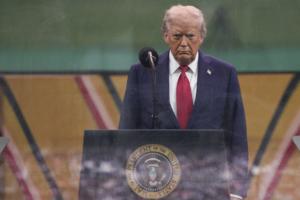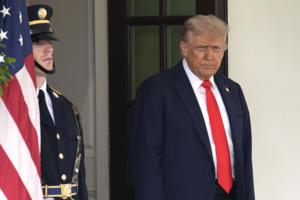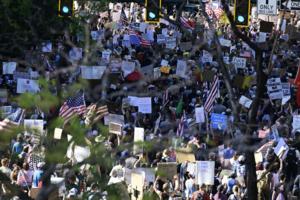Politics
/ArcaMax

Column: Does a michelada without beer still taste as sweet?
I find myself unhappily on trend. Young people everywhere are increasingly “on the wagon” — to use the American idiom for sobriety from the 1920s, when the 18th Amendment to the U.S. Constitution banned the production and sale of alcohol. The wagon in the expression was a public-service vehicle loaded with water to tamp down dust and grime...Read more

Commentary: Secure AI for America's future & humanity's too
A technological revolution is unfolding — one that will transform our world in ways we can barely comprehend. As artificial intelligence rapidly evolves and corporate America’s investment in AI continues to explode, we stand at a crossroads that will determine not just America’s future but humanity’s as well.
Many leading experts agree ...Read more

Commentary: Firsthand footage of ICE raids is both witness and resistance
It has been five years since May 25, 2020, when George Floyd gasped for air beneath the knee of a Minneapolis police officer on the corner of 38th Street and Chicago Avenue. Five years since 17-year-old Darnella Frazier stood on the curb outside Cup Foods, raised her phone, and bore witness to nine minutes and 29 seconds that would galvanize a ...Read more

Editorial: Juneteenth -- A day to celebrate freedom
June 19, 1865.
On that date, Union troops freed a quarter-million African American slaves in Texas. It was the last state to recognize President Abraham Lincoln’s Emancipation Proclamation issued on Jan. 1, 1863.
Juneteenth remained obscure in most of the country throughout the ugly decades of Jim Crow and white supremacy. Since the Civil ...Read more

Andreas Kluth: The MAGA coalition won't survive a bunker-buster in Iran
The foreign policy of President Donald Trump, as captured in the simplistic slogan “peace through strength,” has always been fraught with contradictions. So it was only a matter of time before those would explode, detonating his MAGA base and leaving it and distant parts of the world in ashes. Five months into the president’s second term, ...Read more

David Mills: No Kings, specifically No Trump, in Beaver, Pa.
The most notable protester at last weekend’s No Kings rally in Beaver, Pa., wore an inflatable sumo wrestler costume with an orange t-shirt underneath to make the skin look orange and a crown on his head. He seems to have been one of the organizers. It was one of only two of the old-fashioned theatrical — by old-fashioned I mean 1960s — ...Read more

Gene Collier: The spectacular antithesis of what a president should be
Among the unsightly sights and incongruent sounds of the president’s birthday parade the other day in Washington was the distinctive throbbing bass line of “Barracuda,” a half-century-old rock song by the estimable Heart.
Like many artists before her, Heart’s Nancy Wilson wasn’t especially pleased to be included in the freshest of the...Read more

Commentary: Raising sons in the age of digital masculinity
Celebrating Father’s Day in the U.S. evokes images of dads at grills, toddlers joyfully perched on shoulders and heartfelt tributes. Behind these cherished moments lies a silent crisis: boys and young men navigating a digital minefield where messaging around masculinity promotes dominance over empathy, toughness over vulnerability, and ...Read more

Commentary: Why California won't give up the dream of high-speed rail
We have heard the stories and seen the headlines over and over: “Trump Administration to Pull $4 Billion in Funding for California High-Speed Rail,” “California’s high-speed rail project has ‘no viable path forward,’ new report says.”
In the face of constant negative prognostications and outright attacks by pundits and politicos ...Read more

Editorial: Among Melissa Hortman's missions -- in tragic irony -- were gun safety and reform
Melissa Hortman — who along with her husband, Mark, was shot and killed Saturday by an armed intruder — spent her legislative career trying to make Minnesota safer. Both as a member of the Legislature and speaker of the House, Hortman was a persistent advocate for stronger gun laws, not in the abstract but as a direct response to the toll of...Read more

Editorial: What happened to America First? Keep the US out of Israel-Iran war
The ongoing conflict between Israel and Iran should not involve the United States beyond diplomatic efforts to bring the fighting to an end. A bipartisan resolution in the House of Representatives to block U.S. involvement is a welcome one and deserves support.
Democratic California Rep. Ro Khanna and Republican Kentucky Rep. Thomas Massie ...Read more

Commentary: Americans want to rein in presidential power
President Donald Trump has been attempting to expand presidential power more than any president in recent history, in large part by asserting powers that have been held by Congress, including federal funding and tariffs. Public opinion research has shown clearly and consistently that large majorities—often bipartisan—oppose expanding ...Read more

Marc Champion: How bombing Iran can set back non-proliferation
President Donald Trump seems on the cusp of ordering B2 bombers to join Israel’s assault on Iran’s nuclear program. It could all be a bluff, of course, but I suspect Israeli Prime Minister Benjamin Netanyahu knew his man.
The appeal of being the U.S. president who finally ended the threat of a nuclear-armed Iran – as opposed to the one ...Read more

Editorial: Why Juneteenth matters -- The promise of freedom, liberty and equality must still be redeemed
Two-and-a-half years after Abraham Lincoln’s Emancipation Proclamation, the enslaved people of Texas learned — via the victorious Union Army — that they were liberated. It was June 19, 1865, when U.S. Maj. General Gordon Granger issued an order, reading:
“The people of Texas are informed that, in accordance with a proclamation from the ...Read more

Karen Tolkkinen: Requiem for Minnesota innocence
A bit of Minnesota died Saturday.
A myth, a belief in ourselves, a belief about ourselves.
We believed we were better than this.
That despite our differences, the growing political anger, the rising tendency to see each other as the other, we were still, fundamentally, Minnesotans. We would get through this because Minnesotans are good people...Read more

POINT: A conservative case for protecting Medicaid
With our national debt in excess of $36 trillion and rising, there can be little doubt that putting America’s fiscal house in order should be our priority.
As budget discussions continue, conservatives are rightfully demanding greater fiscal responsibility. However, putting our nation’s finances back on track should not be done on the ...Read more

Editorial: Is the US prepared to help Israel stop Iran?
What happens next in the Middle East is up to Iran. The Iranians can either choose diplomacy or destruction. Either way, the end result must be an absolute end to the rogue regime’s ability to threaten the world with nuclear weapons.
President Donald Trump continues to offer Iran an opportunity to resume negotiations, even as it exchanges ...Read more

Commentary: The Supreme Court failed when it decided against gender-affirming care
The Supreme Court’s decision upholding a Tennessee ban on gender-affirming care for transgender youth is a tragic abdication of the judiciary’s responsibility to protect minorities.
In 1937, in United States vs. Carolene Products, the court famously explained that while courts usually should defer to the political process, deference is ...Read more

Editorial: Back on the farms -- Trump resumes raids on agriculture, restaurants and hotels
It was promising when President Donald Trump listened to the pleading of his agriculture secretary, Brooke Rollins, and flipped on raiding farms, hotels and restaurants to arrest immigrants who don’t have legal status. But then Trump flopped and resumed the raids. Our hope is that he flips again.
This seems like yet one more manifestation of ...Read more

COUNTERPOINT: Why Medicaid reform is appropriate
Battle lines are being drawn in Washington over whether to reduce spending on Medicaid and the Children’s Health Insurance Program (CHIP). The debate, however, should not be framed solely as a fight over cuts. It should focus on reform. There is a need and an opportunity to rein in Medicaid and CHIP costs without compromising the safety net ...Read more























































